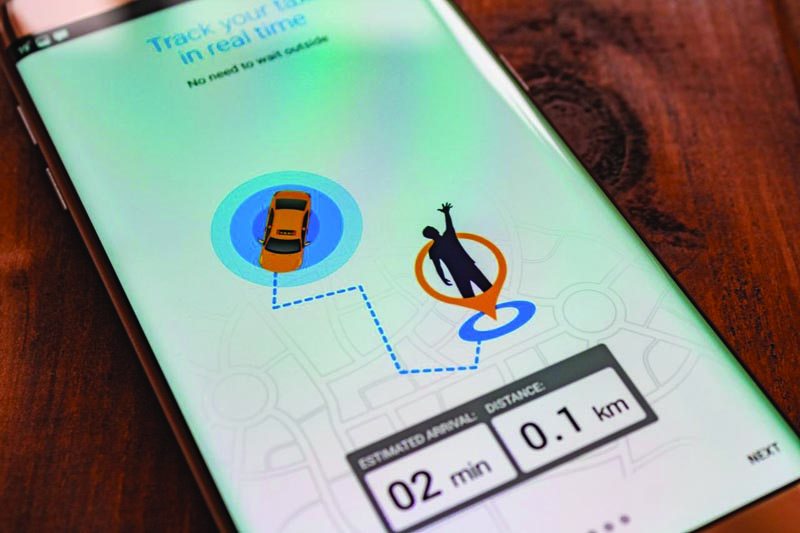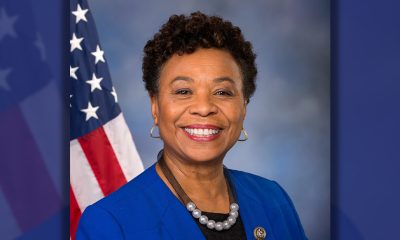Activism
Fight for Uber, Lyft Drivers to Remain Independent Heats Up as November Vote Approaches

As the general election in November gets closer, rideshare and app-based delivery drivers are rounding up support to defeat a ballot initiative that will decide the fate of app-based work in California.
Proposition 22 asks voters to decide whether app-based drivers should be classified as independent contractors or W-2 employees.
App-based companies, including Uber, Lyft, DoorDash, Postmates and Instacart funded the initiative. If voters approve it, drivers who work with those app-based service companies will continue to be classified as independent contractors, but they will begin receiving some benefits including a net basic earning and healthcare subsidies.
If the measure fails, those drivers will have to be reclassified as full-time employees under AB 5, the controversial labor law that went into effect Jan. 1, 2020.
AB 5 made it more difficult for companies to enter into contracts with freelancers and independent contractors.
Representatives from a coalition of groups, including the California State NAACP, California Black Chamber of Commerce and Si Se Puede Foundation signed a letter to the California Legislature registering their support for Prop. 22. The letter argues that the majority of drivers are from minority communities who rely on the flexibility of the work and the immediate income it can provide.
“With California’s unemployment rate reaching a record high, the very characteristics of working with app-based rideshare and delivery platforms – especially high flexibility and low barriers to entry – have proven to be key forms of work for many lower-income families needing access to income during this current pandemic,” the letter reads.
Arguments in favor of Prop. 22 have also focused on protecting the drivers’ choice to operate with independence and flexibility. For Judah Bell, a driver in favor of Prop. 22, the flexibility of being an independent contractor allowed her to manage her schedule around caring for family.
“A lot of [drivers] are caregivers. I was a caregiver to multiple people. My mom got sick so I had to take one to two weeks off for six months,” said Bell, who lives in Vallejo. “I was flying from here to Atlanta one to two weeks out of each month. A traditional job would not have allowed me to do that, and then come back and work for two weeks, then go back.”
Opponents of Prop. 22 include drivers’ advocacy groups, such as Rideshare Drivers United. One strong concern within drivers’ advocacy groups is that rideshare companies like Uber and Lyft could change the app’s algorithms and payment structures however they want, and the drivers would have no input.
“Right now, we’re working with basically all of the workplace protections that existed in like 1890,” said Peter Young, a driver based in L.A. “They have total power over us, and we have no leverage against them. They could cut my pay in half tomorrow and I would have nothing to do about it. At the end of the day, they’re the ones who control everything and we don’t have the government on our side.”
Drivers opposed to Prop. 22 are also concerned about the lack of support that rideshare companies provide. There have been reports that Lyft has not distributed free P.P.E. to enough drivers, as well as complaints that the companies were selling P.P.E. to drivers in their online stores.
“[There are] so many drivers, as we went through this pandemic waiting for unemployment, which some of us still haven’t received, and Uber and Lyft has done nothing, absolutely nothing to assist 80% of the drivers, even if you get sick,” said Michael Franzier, a driver based in Los Angeles.
Cherri Murphy, a lead organizer for Rideshare Drivers United, argued that the proposition is discriminatory against Black and Brown drivers by making it impossible to receive benefits.
“It is an attempt to ensure a caste system for workers who are mostly Black and Brown and immigrants. It creates a sham of our democracy by ensuring that workers will be kept in poverty with no protections and no benefits and no voice for generations to come,” she said. “If this ballot measure is passed, it prevents future elected officials from amending the law requiring an unprecedented seven-eighths majority to amend the law.”
“It’s imperative that we enforce AB 5 so that rideshare drivers can have the benefits and protections that we deserve, considering that the times that we find ourselves in. We deserve unemployment insurance. We deserve worker’s compensation if we get hurt on the job. It’s imperative that we say no,” Murphy said.
Activism
Oakland Post: Week of April 24 – 30, 2024
The printed Weekly Edition of the Oakland Post: Week of April 24 – 30, 2024

To enlarge your view of this issue, use the slider, magnifying glass icon or full page icon in the lower right corner of the browser window. ![]()
Activism
Oakland Post: Week of April 17 – 23, 2024
The printed Weekly Edition of the Oakland Post: Week of April 17 – 23, 2024

To enlarge your view of this issue, use the slider, magnifying glass icon or full page icon in the lower right corner of the browser window. ![]()
Activism
Oakland Schools Honor Fred Korematsu Day of Civil Liberties
Every Jan. 30, OUSD commemorates the legacy of Fred Korematsu, an Oakland native, a Castlemont High School graduate, and a national symbol of resistance, resilience, and justice. His defiant stand against racial injustice and his unwavering commitment to civil rights continue to inspire the local community and the nation. Tuesday was “Fred Korematsu Day of Civil Liberties and the Constitution” in the state of California and a growing number of states across the country.

By Post Staff
Every Jan. 30, OUSD commemorates the legacy of Fred Korematsu, an Oakland native, a Castlemont High School graduate, and a national symbol of resistance, resilience, and justice.
His defiant stand against racial injustice and his unwavering commitment to civil rights continue to inspire the local community and the nation. Tuesday was “Fred Korematsu Day of Civil Liberties and the Constitution” in the state of California and a growing number of states across the country.
One OUSD school is named in his honor: Fred T. Korematsu Discovery Academy (KDA) elementary in East Oakland.
Several years ago, founding KDA Principal Charles Wilson, in a video interview with anti-hate organization “Not In Our Town,” said, “We chose the name Fred Korematsu because we really felt like the attributes that he showed in his work are things that the children need to learn … that common people can stand up and make differences in a large number of people’s lives.”
Fred Korematsu was born in Oakland on Jan. 30, 1919. His parents ran a floral nursery business, and his upbringing in Oakland shaped his worldview. His belief in the importance of standing up for your rights and the rights of others, regardless of race or background, was the foundation for his activism against racial prejudice and for the rights of Japanese Americans during World War II.
At the start of the war, Korematsu was turned away from enlisting in the National Guard and the Coast Guard because of his race. He trained as a welder, working at the docks in Oakland, but was fired after the bombing of Pearl Harbor in 1941. Fear and prejudice led to federal Executive Order 9066, which forced more than 120,000 Japanese Americans out of their homes and neighborhoods and into remote internment camps.
The 23-year-old Korematsu resisted the order. He underwent cosmetic surgery and assumed a false identity, choosing freedom over unjust imprisonment. His later arrest and conviction sparked a legal battle that would challenge the foundation of civil liberties in America.
Korematsu’s fight culminated in the Supreme Court’s initial ruling against him in 1944. He spent years in a Utah internment camp with his family, followed by time living in Salt Lake City where he was dogged by racism.
In 1976, President Gerald Ford overturned Executive Order 9066. Seven years later, the 9th Circuit Court of Appeals in San Francisco vacated Korematsu’s conviction. He said in court, “I would like to see the government admit that they were wrong and do something about it so this will never happen again to any American citizen of any race, creed, or color.”
Korematsu’s dedication and determination established him as a national icon of civil rights and social justice. He advocated for justice with Rosa Parks. In 1998, President Bill Clinton gave him the Presidential Medal of Freedom saying, “In the long history of our country’s constant search for justice, some names of ordinary citizens stand for millions of souls … To that distinguished list, today we add the name of Fred Korematsu.”
After Sept. 11, 2001, Korematsu spoke out against hatred and discrimination, saying what happened to Japanese Americans should not happen to people of Middle Eastern descent.
Korematsu’s roots in Oakland and his education in OUSD are a source of great pride for the city, according to the school district. His most famous quote, which is on the Korematsu elementary school mural, is as relevant now as ever, “If you have the feeling that something is wrong, don’t be afraid to speak up.”
-

 Activism4 weeks ago
Activism4 weeks agoOakland Post: Week of March 27 – April 2, 2024
-

 #NNPA BlackPress4 weeks ago
#NNPA BlackPress4 weeks agoBeloved Actor and Activist Louis Cameron Gossett Jr. Dies at 87
-

 Community2 weeks ago
Community2 weeks agoFinancial Assistance Bill for Descendants of Enslaved Persons to Help Them Purchase, Own, or Maintain a Home
-

 Activism3 weeks ago
Activism3 weeks agoOakland Post: Week of April 3 – 6, 2024
-

 Business2 weeks ago
Business2 weeks agoV.P. Kamala Harris: Americans With Criminal Records Will Soon Be Eligible for SBA Loans
-

 Activism2 weeks ago
Activism2 weeks agoOakland Post: Week of April 10 – 16, 2024
-

 Community2 weeks ago
Community2 weeks agoAG Bonta Says Oakland School Leaders Should Comply with State Laws to Avoid ‘Disparate Harm’ When Closing or Merging Schools
-

 Community1 week ago
Community1 week agoOakland WNBA Player to be Inducted Into Hall of Fame






















































